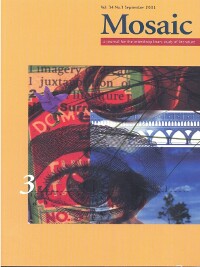Issue 34.3
Overview

General Issue
Published: September 2001
View the issue introduction or see the issue summary and contents below.
9 essays, totalling 192 pages
$15.00 CAD
This general issue of Mosaic boasts two interviews: one with Mary Ann Caws and another with Linda Hutcheon and Michael Hutcheon. These interviews suitably accompany eight essays that focus on various approaches to “the gaze.” Several essays, including one by Caws herself, examine various works of art, including paintings, photography, and diagrams. Other essays in the issue focus on the narrative image and other forms of representation.
“We Haven’t Left the Body”: An Interview with Mary Ann CawsDawne McCance Monday, 5 February 2001, was a cold, snowy day in New York City. Dawne McCance (DM) conducted this interview with Mary Ann Caws (MAC) in front of a warm fire in the Princeton Club. Mosaic is honoured to publish the interview here. | |
Tom Phillips: Treating and TranslatingMary Ann Caws In the following essay, Mary Ann Caws reflects on the work of Tom Phillips, in particular his “found” document, A Humument. | |
American Literary Realism and the Problem of Trompe l’Oeil PaintingAnne Trubek Defined by its lack of single-point perspective, trompe l’oeil painting presents an immanent view of reality. The paintings depend upon viewers to construct meaning, thus offering an illustration and critique of theories of American literary realism that rely on a Cartesian metaphorics of vision. | |
Translating from Language to Image in Bill Forsyth’s HousekeepingErika Spohrer The fluid, slipping language of Marilynne Robinson’s novel Housekeeping masterfully disrupts conventional narrative form. This essay draws on Judith Butler’s work to argue that in the film Housekeeping, director Bill Forsyth translates the fluidity of Robinson’s writing into its visual counterparts. | |
Metaphors for Suffering: Antjie Krog’s Country of My SkullMéira Cook This essay examines Antjie Krog’s journalistic memoir, Country of My Skull, a post-traumatic narrative that performs the author’s response to the South African Truth and Reconciliation Commission hearings. Krog’s memoir provokes questions of how effectively postmodern narratives represent postcolonial issues, and how a writer might represent atrocity without appropriating its victims’ pain. | |
The Waste Land, Liminoid Phenomena, and the Confluence of DadaShawn R. Tucker T.S. Eliot’s The Waste Land participates with other Dada texts in a post-World War I de-sacralization. Like Ezra Pound’s and Francis Picabia’s Dada works, The Waste Land is a liminoid text that questions traditional sacra and gives the lie to modernist ideals of progress and utopianism. | |
Sartre/RéageD.R. Koukal This essay claims that Pauline Réage’s infamous novel Story of O was heavily influenced by part 3 of Jean-Paul Sartre’s Being and Nothingness. The claim is supported by close analysis of relevant passages from both works. | |
Oral Methods: Pathologizing the Deaf “Speaker”Nicole Markotic For Deaf adults, American Sign Language is communication and cultural identity. For medical and teaching professionals, sign language is a signal of disability. Drawing from the work of theorists Walter Ong, Susan Sontag, Mairian Corker, and Douglas Baynton, and writer Thomas Spradley, the author of this essay discusses metaphor and metaphors of deafness, examining theoretical and literary texts that debate the issue of signed communication. | |
The Prison in the Arcade: A Carceral Diagram of Consumer SpaceTony Fabijancic Arguing that a carceral diagram emerged in nineteenth-century consumer spaces like arcades and shopping boulevards, this essay amalgamates the work of Benjamin and Foucault by exploring Baron Haussmann’s urban reconstructions, the rise of crowd psychology as a discipline, and the use of vision in the carceral phantasmagoria of shopping. | |
“Bodily Charm”: An Interview with Linda Hutcheon and Michael HutcheonDawne McCance On 31 March 2001, at the Fort Garry Hotel in Winnipeg, Linda Hutcheon (LH) and Michael Hutcheon delivered the Warhaft Memorial Lecture, “Staging the Visual Arts: The Operatic Gaze.” On the occasion of the Warhaft lecture, Dawne McCance (DM) conducted an inter(re)view with the Hutcheons on their book, Bodily Charm: Living Opera. |